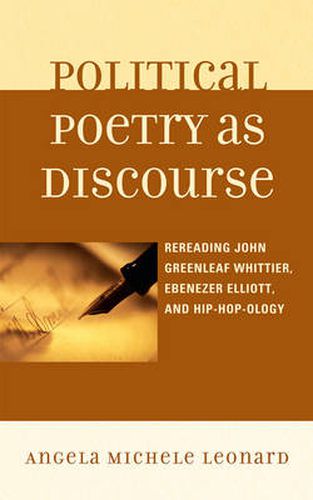Readings Newsletter
Become a Readings Member to make your shopping experience even easier.
Sign in or sign up for free!
You’re not far away from qualifying for FREE standard shipping within Australia
You’ve qualified for FREE standard shipping within Australia
The cart is loading…






Political Poetry as Discourse examines the works of the political poets John Greenleaf Whittier and Ebenezer Elliott, drawing comparisons to contemporary hip hoppers who take their words from local newspapers and other discursive sources that they read, hear, and observe. Local presses and news vehicles stand as cultural material forms that supply poets with words, particularly words that congeal into patterns of language, allowing the creation of a poetic discourse. As readers of these poets apply techniques and theories of discourse analysis, they reveal how poets borrow, lift, hijack, or resituate words from one or more different genres to use as tools of political change. Leonard engages with the critical toolboxes of content analysis, semiosis, and deconstruction to demonstrate how to critically investigate and interrogate the images, sounds and words not just of politically engaged poets, but also of any disseminator of culture and news.
Moving beyond theory into praxis, this book becomes a model of its own transgressive premise by thinking, analyzing, writing, and teaching against the grain. Its focus on language as unbounded discourse makes this book a relevant and insightful demonstration in democratic pedagogy and in teaching for transformation.
$9.00 standard shipping within Australia
FREE standard shipping within Australia for orders over $100.00
Express & International shipping calculated at checkout
Political Poetry as Discourse examines the works of the political poets John Greenleaf Whittier and Ebenezer Elliott, drawing comparisons to contemporary hip hoppers who take their words from local newspapers and other discursive sources that they read, hear, and observe. Local presses and news vehicles stand as cultural material forms that supply poets with words, particularly words that congeal into patterns of language, allowing the creation of a poetic discourse. As readers of these poets apply techniques and theories of discourse analysis, they reveal how poets borrow, lift, hijack, or resituate words from one or more different genres to use as tools of political change. Leonard engages with the critical toolboxes of content analysis, semiosis, and deconstruction to demonstrate how to critically investigate and interrogate the images, sounds and words not just of politically engaged poets, but also of any disseminator of culture and news.
Moving beyond theory into praxis, this book becomes a model of its own transgressive premise by thinking, analyzing, writing, and teaching against the grain. Its focus on language as unbounded discourse makes this book a relevant and insightful demonstration in democratic pedagogy and in teaching for transformation.